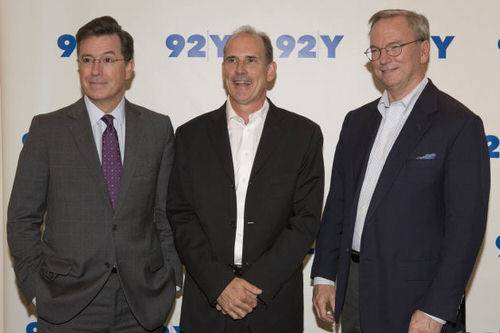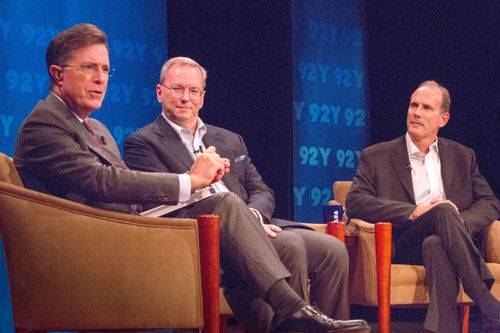Editor’s note: This post was originally published by our partners at Biography.

On Tuesday night, The Colbert Report host moderated a panel with Google Executive chairman Eric Schmidt and Jonathan Rosenberg, Google’s Senior VP of Product Management at New York City’s 92Y. The topic: Schmidt and Rosenberg’s new book, How Google Works, an inside look into the technology corporation’s nurturing history and culture.
Like an hour-long Colbert Report interview, the talk was a rapid-fire smorgasbord of wisecracks and Google trivia, Schmidt and Rosenberg painting their picture of a fully connected, Google-driven world. The evening was a futurist’s dream and a technophobe’s nightmare.
As Colbert jumped from point to point, here are a few of the insights we picked up at the panel:
Google Glass: Still a Thing?
To kick things off, Colbert went straight for a topic that would earn him a laugh and a compelling response: Glass. The world lost its minds when Google’s Android phone-like eyewear premiered—was this the next great technological achievement?
The fervor has died down, but Schmidt stresses that Glass is slowly becoming an essential accessory in a number of fields, citing surgeons who need their hands to operate but want to document or stream their work via Glass’ on-board camera.
It Takes Five Interviews to Land a Job at Google
“No more, no less,” Schmidt said. There wasn’t always a set number of hoops to jump through. According to the former CEO, one prospective employee went through 18 interviews, only to be rejected at the end. Schmidt had his own trial to endure when he applied for the CEO gig in 2001. Key Google staff insist on testing potential major hires by dragging them to an “extreme” outing, like surfing or skiing. Schmidt went to Burning Man. He appreciated the outdoor festival’s “no pictures” policy. “Tell that to Google Image,” Colbert remarked.
Google Employs “Smart Creatives”
What makes a great Google employee? Someone analytical, personable, and individual—the company’s definition of a “smart creative.” They’re not looking for geniuses, but people who can function within the company.
Schmidt said when he arrived at Google, it had 150 employees. Today the innovative enterprise has 50,000 people on board. Colbert asked the natural question of Schmidt and Rosenberg: “Are you like Kirk and Spock?”
“Exile knaves, but fight for divas” – Jonathan Rosenberg on Google’s mantra for team-building
“Consensus Requires Dissension” and Consensus Requires Women
Google is all about the quotable mantras. Rosenberg offers “exile knaves, but fight for divas,” which speaks to its team-building efforts. “Fake 10 tons not 10 percent” is all about work ethic and why failure is acceptable within Google’s development timelines.
Schmidt’s biggie is “consensus requires dissension,” which helps Google avoid the “Bobblehead yes” where everyone just agrees with a lackluster idea so they can move on with a meeting. Schmidt demands debate and argument so his team can achieve true consensus.
He also stressed the importance of female voices. While the men of Google will often be louder, quicker, and blunter with their responses, Schmidt says he always clears the air for a woman’s opinion, scientifically proven to be more thoughtful.
Google Will Release a Smart Contact Lens for Diabetics
On top of the more obvious work—Chrome, Gmail, and Internet-centric developments—there’s Google X, the home of research and development that turns science fiction into science fact. The division’s latest development? A contact lens equipped with a microchip that can read insulin levels in diabetics. When blood sugar levels are low, the lens changes colors to prompt action.
“How do you charge it?” Colbert asked, speaking for the entire audience with mouth agape. “Bioelectricity in eye fluid,” replied Schmidt. Collective gasp.
Where Are the Self-Driving Cars? Blame Traffic Regulators
Wondering where Google’s much buzzed about self-driving cars were, Schmidt assured Colbert that they were still in active development, with one major problem to overcome. The cars stop faster than any human could at a red light or crash scenario. Rosenberg says Google cars have an accident-free test history (and they’ve driven on highways).
While the government traffic enforcement continues to debate whether Google cars should be able to drive on the open road, the major internal problem is police. The cars won’t stop just because a cop tells it to. Colbert thinks they should keep the flaw built in because he already has the perfect line: “I’m sorry, officer, my car was drunk.”
Optimistically, Schmidt believes aspects of the car technology could be integrated into existing models. Imagine a student driver who could avoid all accidents with an intelligent car.

Google Is All About Putting Superfast Internet In Every Home
Right now, Google’s main goal is to put hyper-speed Internet in every home. According to Schmidt, the Google Fiber program is 100 times faster than your typical internet connection, running upwards of 1,000 Mbps. “A gigabit is like taking drugs,” he says.
The all-Google lifestyle doesn’t stop there. Schmidt told Colbert that the next practical innovation would be virtual reality, “images that envelop you.” Instead of watching The Colbert Report through a screen, Colbert could be projected from a tube into homes. Schmidt held specifics close to the chest, but with the advent of Oculus Rift and parallel competitors, we know Google will be all over VR when it’s time (which sounds like the next few years).
Colbert’s Viacom-vs-YouTube Deposition Confused Lawyers
The night was all about Schimdt and Rosenberg, but Colbert had Google stories to share, too: Apparently, when he was deposed in Viacom’s $1 billion copyright lawsuit against Google and YouTube, lawyers had problems differentiating between statements made by the actual Colbert and his fictional character “Stephen Colbert.”
To shift personas, Colbert would change the position of his coffee cup on a table depending on which version of himself he was referring to.
Google Isn’t Always on the Right Path
Google always has a five-year plan in place. According to Rosenberg, they’re occasionally ahead of themselves. A few years back, the economic advisor would have told you that the future was all about one device that could do it all. He was wrong.
“Convergence is not on a device, but in the cloud,” Rosenberg said. Schmidt consoled his comrade, adding that, while we still use multiple devices, the mobile device is still the key. He made a pointed claim: “97% of people sleep next to their phones.”

Porn Provoked One of Google’s Biggest Features
Google used to have an unofficial program called “Cookies for Porn.” Google Image’s “SafeSearch” was designed to detect the naked human body and remove it from typical search results. If a developer spotted porn undetected by the algorithm, they got a cookie—and the algorithm was reworked to be more efficient.
The responsive evolution of the algorithm opened the door for one of Google Image’s coolest features, “More Like This” (or “Search By Image”), a feature that’s all about precision.
Don’t Ask Them About Advertising
Google has another corporate mantra: “Don’t Be Evil.” For all the comedy Colbert dished over the course of the night, he earned major credit for asking a provocative question: What’s Google’s definition of “evil” and has anyone ever come close?
Schmidt admitted that during one conversation about using search knowledge to target ads at users, an employee screamed “being evil!” The idea was instantly killed (though a variant of the practice certainly remains in place). Colbert had a difficult time penetrating the advertising side of Google—for all their world-changing inventions, the company is still driven by ads and selling information. It’s a shady subject. Schmidt was tight-lipped.
Big Data Collection Will (Should?) Improve A.I.
While Schmidt tore the NSA a new one when snooping came up, Google’s positive spin on “Big Data” gathering is all about making the search engine that started it all smarter. By mining our every move, Schmidt believes that Google Search will be able to interact with a user via voice recognition and, not only dig up whatever a person is looking for, but predict what he or she will want to search for and when and where they’ll want to search for it.
Schmidt wants Search to answer “judgment questions”: Should I go to Paris or Hawaii on vacation? Should I go out for Mexican next Tuesday? Should I see Beyonce in concert? Google’s A.I. will tell you. Schmidt predicted the technology would be upon us in five years (and, after prodding from Colbert, says it’ll be hard to fall in love with it like in the movie Her).
Colbert Only Has 42 Shows Left
An off-hand quip unearthed a stark revelation: There are only 42 more episodes of The Colbert Report left! It was announced earlier this year that Colbert would leave his Emmy and Peabody Award-winning show to take over David Letterman’s Late Show sometime in 2015. With The Minority Report With Larry Wilmore set to premiere in January, it was obvious Colbert’s show would have to end sometime before the year’s end. It just didn’t hit us until now.










